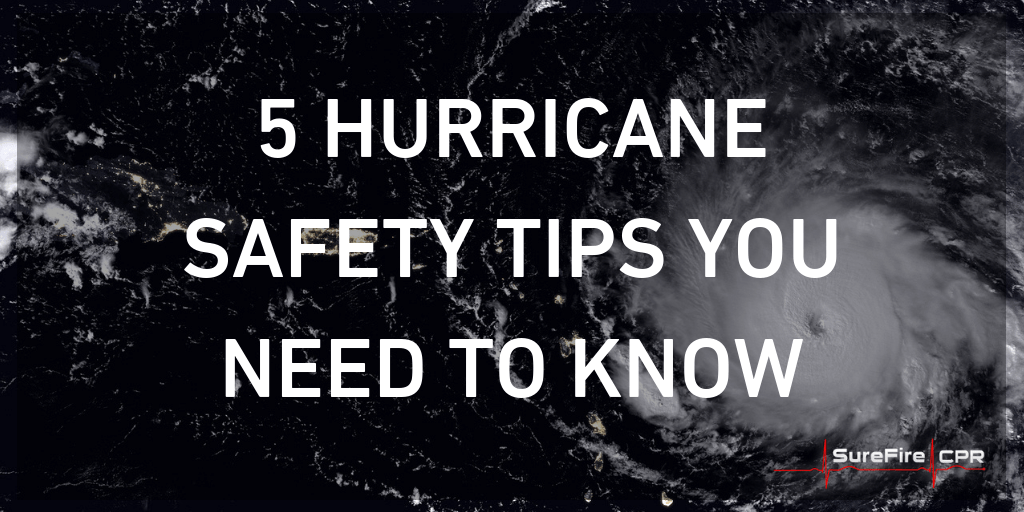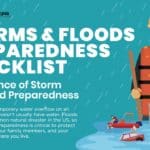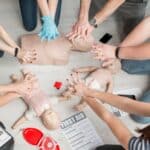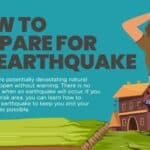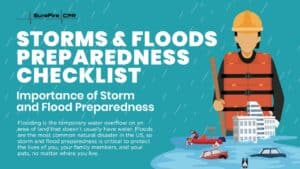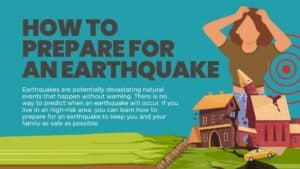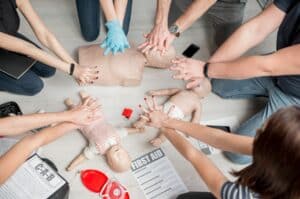Hurricane Florence recovery efforts are underway, and the costs associated with the storm could be substantial. The total costs of Florence-related property damage and disruption are projected to fall between $17 billion and $22 billion, according to risk management firm Moody’s Analytics. Additionally, Moody’s expects Florence to rank among the 10 costliest hurricanes.
The Atlantic hurricane season runs from June to November, but storms sometimes occur outside these months. As such, it is important to know how to prepare for hurricanes. If people have the proper hurricane safeguards in place, they can limit the risk of property damage due to a hurricane. Perhaps most important, those who know how to identify and address hurricane dangers could prevent the loss of life during a hurricane.
Ultimately, there are lots of things that you can do to get ready for a hurricane and stay safe until the storm passes, such as:
- Build a Hurricane Survival Kit
A hurricane survival kit should include the following items:
- Water: Keep at least one gallon of water per member of your household for at least three days; this water can be used for both drinking and sanitation.
- Food: Keep at least a three-day supply of food; all food items should be non-perishable.
- Radio: Choose a battery-powered or hand crank radio that allows you to receive continuous weather updates.
- Flashlight: Select a flashlight that is rugged, durable and easy to use. Make sure to include extra batteries as well.
- First Aid Kit: Use a first aid kit that includes bandages, nitrile gloves, gauze and other essential medical supplies.
- Wrench/Pliers: Add a wrench or pliers that you can use to turn off utilities as needed.
- Dust Mask: Choose a dust mask that allows you to filter out air contaminants.
Customize your hurricane emergency kit based on your individual needs. For instance, if you take prescription medications, you should include these medications in your hurricane survival kit. Or, if you have a dog or cat, you should include extra water, food and various pet supplies in your hurricane survival kit.
- Protect Your Home
Hurricane property damage can escalate quickly. Fortunately, there are many ways to safeguard your home in a hurricane, including:
- Remove debris from rain gutters and downspouts
- Bring outdoor furniture, decorations, trash cans or anything else that is not tied down outside your home indoors
- Install an emergency generator
- Trim trees and shrubs around your home
- Use straps or clips to fasten your roof to your home
- Cover your home’s windows using storm shutters or marine plywood that is pre-cut and ready to install
Also, learn about your home’s elevation and find out if your area is flood-prone. This will help you identify nearby levees, dams and other potential hurricane property dangers.
- Find Shelter
During a hurricane, it is important to do everything possible to protect yourself and your loved ones against heavy wind and flooding. If authorities tell you to evacuate your home, follow their instructions. That way, you can take refuge in a designated storm shelter. You can also make arrangements with friends that don’t live in the hurricane area. If you are ordered to evacuate, you already know you have a place to go and can leave quickly.
Avoid swimming, walking or driving in flood waters during a hurricane – without exception. If you cannot make it to a designated storm shelter, find a small, interior, windowless room on the lowest level of a building that is not susceptible to flooding.
If you shelter in place with family members, friends and other loved ones, try to remain calm. New noises and smells may cause your stress levels to rise during a hurricane, so you should try to arrange your shelter to make it a personal space. If you feel comfortable in your hurricane shelter, you may be able to help others feel comfortable throughout the storm as well.
- Make a Family Hurricane Communication Plan
If you are forced to evacuate your home in a hurricane, there is a risk that you may be separated from family members. Thus, you should create a plan to ensure you can stay in touch with loved ones throughout a hurricane, even if you lose power.
Collect the contact information for all family members included in your hurricane communication plan. Then, you should share this information with all plan members and post it in a central location in your home. You can even print a wallet-sized card of family members’ contact information that each plan member can take on the go. And don’t forget to review and practice your family communication plan; otherwise, family members may struggle to get in touch with one another when it matters most.
You should strive to communicate with family members via phone, text messages, emails and social media during a hurricane. With multiple communication methods included in your hurricane communication plan, you can boost the likelihood that you can get in touch with family members.
Texts tend to be faster and more reliable than phone calls in hurricanes, too. Phone lines frequently become overloaded in hurricanes, and as a result, it may be tough to make phone calls during storms.
- Get CPR-Certified
Cardiopulmonary resuscitation (CPR) training empowers individuals with the ability to administer life-saving assistance in hurricanes. It teaches people how to use an automated external defibrillator (AED), assist conscious and unconscious choking victims and much more.
It doesn’t take long to become CPR-certified. A typical CPR training class requires just a few hours to complete, and individuals can usually enroll in a CPR course at their convenience. Plus, after an individual completes a CPR certification class, he or she will obtain a CPR certification card that stays valid for two years.
Of course, other life-saving training classes can be completed in conjunction with CPR courses. Some individuals, for example, enroll in basic first aid training that focuses on how to aid people who are dealing with bone and muscle injuries, seizures and other life-threatening issues.
For those who want to become difference-makers in hurricanes, it helps to prepare accordingly. Thanks to the aforementioned tips, you can minimize risk and protect yourself and others during a hurricane.

